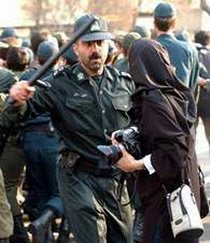
HERE'S HOW International Women's Day was celebrated Thursday in Tehran: Riot police swarmed over a few dozen women who bravely gathered near the parliament in an attempt to hold a peaceful demonstration. Some were beaten; some were arrested and taken away in vans. All mention of the demonstration was purged from state-controlled media, and independent papers and blogs were warned not to cover it, according to the Los Angeles Times.
Repression of women is an everyday reality in Iran, but this week stood out. In addition to Thursday's crackdown, more than 30 women were arrested in a protest last Sunday. The group, which included almost all of Iran's leading female human rights activists, had gathered outside a courthouse in solidarity with five women who are on trial for organizing a protest in June. Three of those arrested were still being held on Friday, including Jila Baniyaghoob, a journalist, and Shadi Sadr, a lawyer. The women had been taken to Tehran's notorious Evin prison, where legions of political prisoners have been held and many tortured.
Government propaganda portrays these activists as tools of Western powers who want to overthrow the government. Actually, the movement has far more modest and specific goals. It is seeking equal rights for women in Iran's penal and family codes, under which girls as young as 9 can be stoned to death on charges of adultery and a woman's life is valued at only half that of a man's. The activists are trying to collect a million signatures on a petition to parliament to end such discrimination.
Their courageous struggle and the regime's violent reaction to it are worth remembering at a time when the United States is edging toward opening a dialogue with the Iranian government. Today U.S. and Iranian officials will attend a regional conference in Baghdad. The implicit promise of such contacts, which we have supported, is a U.S.-Iranian rapprochement in which Tehran gives up its nuclear program and stops its support for militants in Iraq and around the Middle East in exchange for improved political and economic relations with the United States.
Such an accord would be in the U.S. interest. But another vital interest must be continued support for those people and movements in Iran that fight for human rights and democracy. Unless they survive and grow stronger, U.S.-Iranian relations aren't likely to progress very far.

No comments:
Post a Comment